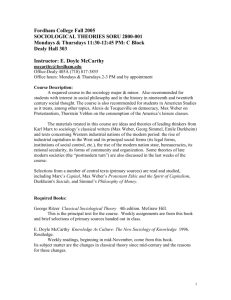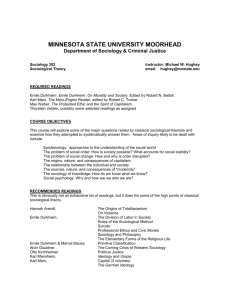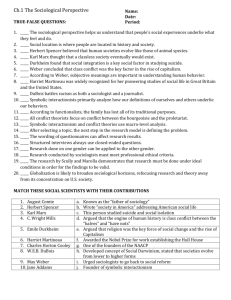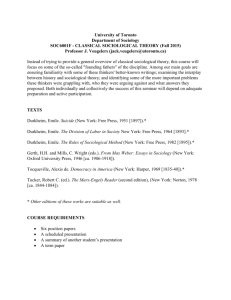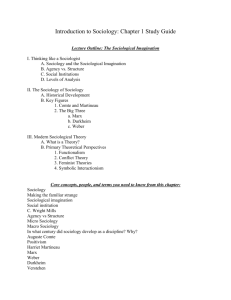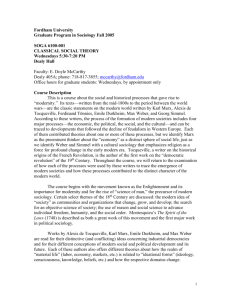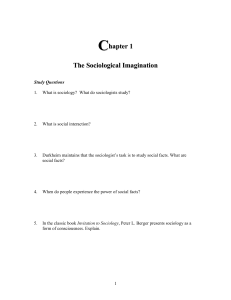Classical Sociological Theories
advertisement
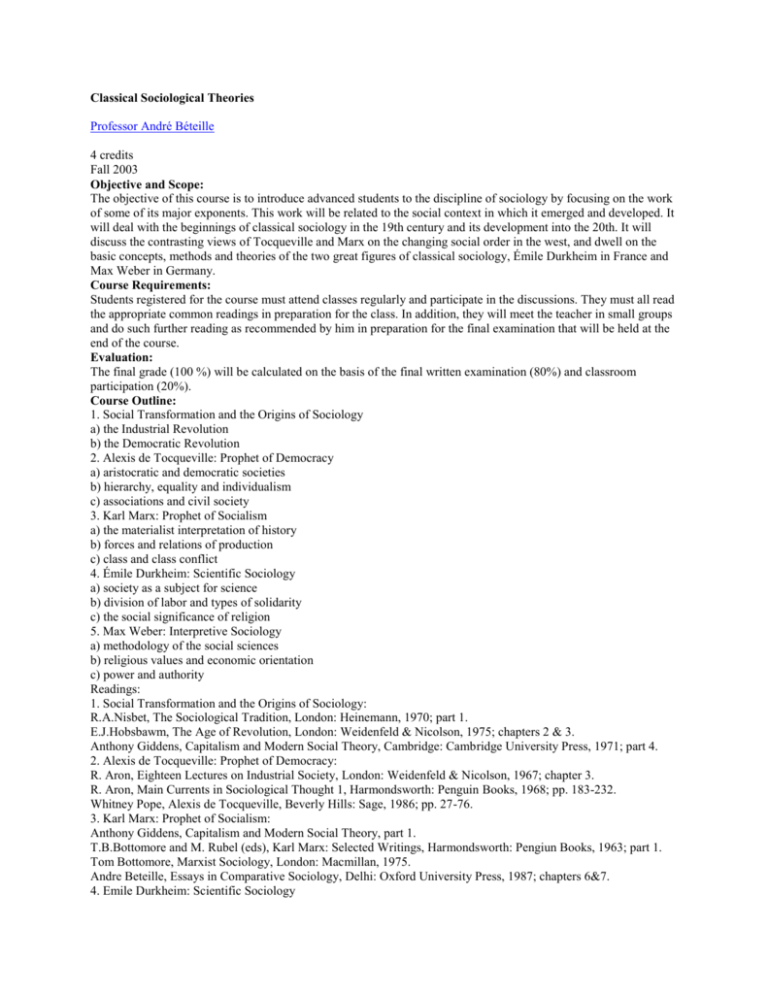
Classical Sociological Theories Professor André Béteille 4 credits Fall 2003 Objective and Scope: The objective of this course is to introduce advanced students to the discipline of sociology by focusing on the work of some of its major exponents. This work will be related to the social context in which it emerged and developed. It will deal with the beginnings of classical sociology in the 19th century and its development into the 20th. It will discuss the contrasting views of Tocqueville and Marx on the changing social order in the west, and dwell on the basic concepts, methods and theories of the two great figures of classical sociology, Émile Durkheim in France and Max Weber in Germany. Course Requirements: Students registered for the course must attend classes regularly and participate in the discussions. They must all read the appropriate common readings in preparation for the class. In addition, they will meet the teacher in small groups and do such further reading as recommended by him in preparation for the final examination that will be held at the end of the course. Evaluation: The final grade (100 %) will be calculated on the basis of the final written examination (80%) and classroom participation (20%). Course Outline: 1. Social Transformation and the Origins of Sociology a) the Industrial Revolution b) the Democratic Revolution 2. Alexis de Tocqueville: Prophet of Democracy a) aristocratic and democratic societies b) hierarchy, equality and individualism c) associations and civil society 3. Karl Marx: Prophet of Socialism a) the materialist interpretation of history b) forces and relations of production c) class and class conflict 4. Émile Durkheim: Scientific Sociology a) society as a subject for science b) division of labor and types of solidarity c) the social significance of religion 5. Max Weber: Interpretive Sociology a) methodology of the social sciences b) religious values and economic orientation c) power and authority Readings: 1. Social Transformation and the Origins of Sociology: R.A.Nisbet, The Sociological Tradition, London: Heinemann, 1970; part 1. E.J.Hobsbawm, The Age of Revolution, London: Weidenfeld & Nicolson, 1975; chapters 2 & 3. Anthony Giddens, Capitalism and Modern Social Theory, Cambridge: Cambridge University Press, 1971; part 4. 2. Alexis de Tocqueville: Prophet of Democracy: R. Aron, Eighteen Lectures on Industrial Society, London: Weidenfeld & Nicolson, 1967; chapter 3. R. Aron, Main Currents in Sociological Thought 1, Harmondsworth: Penguin Books, 1968; pp. 183-232. Whitney Pope, Alexis de Tocqueville, Beverly Hills: Sage, 1986; pp. 27-76. 3. Karl Marx: Prophet of Socialism: Anthony Giddens, Capitalism and Modern Social Theory, part 1. T.B.Bottomore and M. Rubel (eds), Karl Marx: Selected Writings, Harmondsworth: Pengiun Books, 1963; part 1. Tom Bottomore, Marxist Sociology, London: Macmillan, 1975. Andre Beteille, Essays in Comparative Sociology, Delhi: Oxford University Press, 1987; chapters 6&7. 4. Emile Durkheim: Scientific Sociology Anthony Giddens, Capitalism and Modern Social Theory; part 2. Steven Lukes, Emile Durkheim, Harmondsworth: Pengiun Books, 1973; chapters 7, 10, 11 and 23. D. Lockwood, Solidarity and Schism, Oxford: Clarendon Press, 1992; parts 1 & 2. 5. Max Weber: Interpretive Sociology Raymond Aron, Main Currents in Sociological Thought 2, Harmondsworth: Pengiun Books, 1970; pp. 185-258. Anthony Giddens, Capitalism and Modern Social Theory; part 3. W.G. Runciman (ed), Weber, Cambridge: Cambridge University Press, 1978; part IV Additional Readings J.C. Alexander, Theoretical Logic in Sociology, Berkeley: University of California Press, vol. 2, 1982/vol 3, 1983. Alexis de Tocqueville, Democracy in America, New York: alfred Knopf, 1956, 2 vols. R. Herr, Tocqueville and the Old Regime, Princeton: Princeton University Press, 1962. S. Drescher, Dilemmas of Democracy, Pittsburgh: University of Pittsburgh Press, 1968. J.A. Schumpeter, Capitalism, Socialism and Democracy, London: Allen & Uniwin, 1976, part1. L. Kolakowski, Main Currents of Marxism, Oxford: Clarendon Press, 1978, vol. 1. G.A. Cohen, Karl Marx’s Theory of History, Oxford: Clarendon Press, 1978. Émile Durkheim, The Rules of Sociological Method, London: Macmillan, 1982. Émile Durkheim, The Division of Labour in Society, New York: The Free Press, 1984. W.F.S. Pickering (ed), Durkheim on Religion, London: Routledge & Kegan Paul, 1975. Max Weber, The Protestant Ethic and the Spirit of Capitalism, London: Allen & Unwin, 1976. H.H.Gerth and C.W. Mills (eds), From Max Weber: Essays in Sociology, New York: Oxford University Press, 1946. R. Bendix, max Weber: An Intellectual Portrait, New York: Doubleday, 1960.

